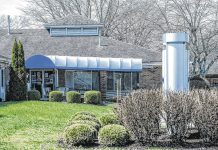Early voters may need to keep a significant change in mind during the upcoming primary.
It appears that NexusPark in Columbus, where early voting has taken place since 2020, will not be available for voters this spring, Bartholomew County Clerk Shari Lentz said Monday.
“The election board is meeting this week to try to see what our options are,” Lentz told the Bartholomew County Commissioners Monday. “We really need a good site for early voting for 28 days.”
Early primary voting begins at 8 a.m. on Tuesday, April 9 and ends at noon on Monday, May 6.
Officials with the city of Columbus, which is part-owner of NexusPark, said ongoing construction is why early voting can’t be held at that location this spring, commissioner Chairman Larry Kleinhenz said.
Many local residents have expressed their preference for the former mall property, Commissioner Tony London said. In addition, several early voters have gotten used to the 25th Street complex and might not be aware if a different location is chosen, Lentz said.
According to Kleinhenz, the commissioners intend to reach out to officials at Columbus City Hall to see if construction has progressed enough at NexusPark to allow early voting.
“Maybe it’s not too late,” Kleinhenz said. “Because the fairgrounds is one of our next options, and it is really not as convenient or accessible as Nexus.”
What concerns London is that voters might not be able to get to the fairgrounds if heavy flooding closes parts of State Road 11, he said.
In a related development, the commissioners accepted a $14,691 grant presented to Lentz’s office on Jan. 17 through the federal Help America Vote Act.
The county clerk said $5,591 will be spent to hire greeters for each of the 14 vote centers during this year’s primary and general elections. Their job will be to instruct voters on what they need to cast a ballot, as well as help residents better understand the modern voting process, Lentz said last month.
Permission was also granted to invest $12,960 for the purchase of 32 electronic poll pads from the St. Louis, Missouri-based Knowink, LLC. Poll pads, which are essentially Apple iPad computers, have replaced traditional paper poll books, so when a voter enters a polling location, they can quickly be checked in, Lentz said. Poll pads are connected through the web to the statewide voter registration system, so after an address is verified, the voter only has to provide a signature, the county clerk said.
The remaining $9,100 from the grant will be used to purchase hot-spots that enable poll pads at each vote center to access the internet. A hot-spot is a physical location where people can use Wi-Fi via a wireless local area network with a router connected to an internet service provider.
“To be clear, the voting machines are not connected to the internet,” London emphasized.
“They are a separate entity from poll pads, and are not connected to the internet in any way,” Lentz said.





